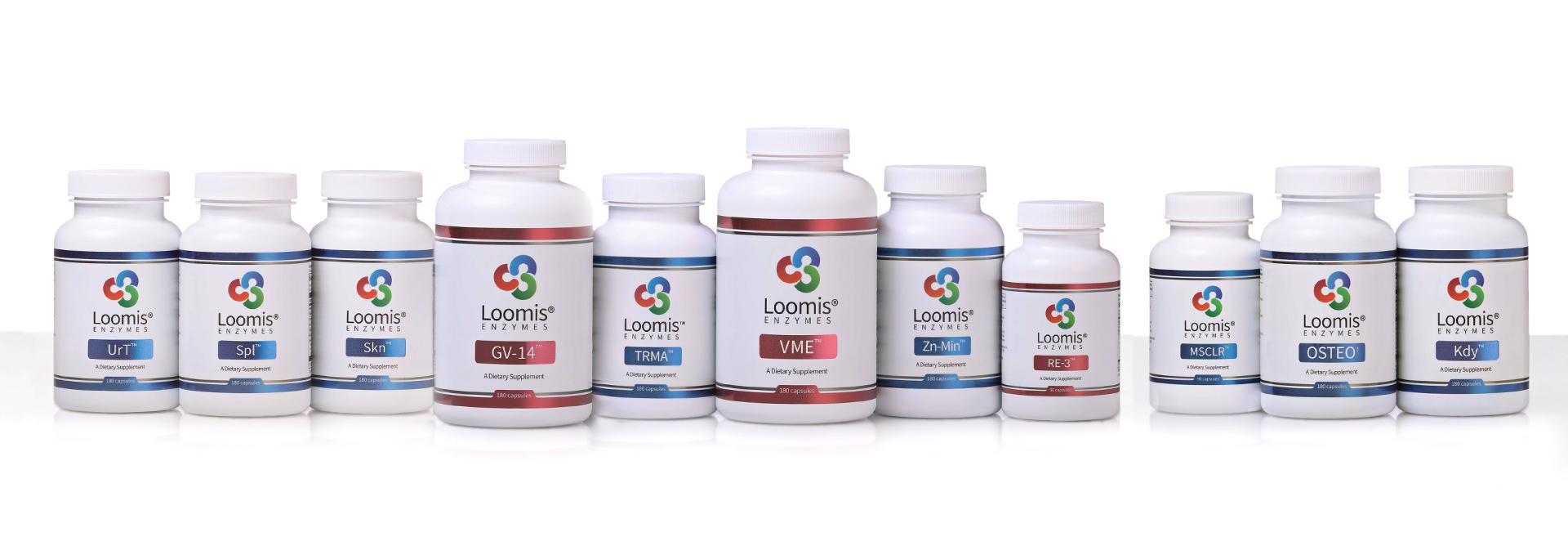Digestive Enzyme Therapy
What are enzymes? Enzymes are the spark of life, essentially the workers that help your body function. They are in every organ, tissue, and fluid, with each having its own specific job to do. They activate our muscles, stimulate our nerves, help us think...pretty much every function you can think of is influenced by these work horses. Think of them as the "construction workers" in your body! They also convert the nutrients in food to something that your body can use. However, what happens when this system isn't working properly? There is not one broad answer, as each individual is completely unique. When symptoms present themselves, we can get to the root of the issue through scientifically backed and well tested means.
The following symptoms may indicate that your body is not utilizing and/or processing food efficiently and could benefit from enzyme therapy:
The following symptoms may indicate that your body is not utilizing and/or processing food efficiently and could benefit from enzyme therapy:
- Fatigue
- Constipation (less than one bowel movement per day)
- Diarrhea (soft bowel movements three or more times a day.)
- Abdominal gas
- Headaches
- Stiff, sore joints
- Heartburn/indigestion
- Anxiety/Irritability
- Depression
- Restlessness/Insomnia
If we are not digesting food properly, negative physical results may be a consequence.
If you struggle with digesting proteins, you may notice:
If you struggle with digesting carbohydrates, you may experience:
If you struggle with digesting fats, you may notice:
- Premenstrual syndrome
- Muscle cramps at night
- Stiff, sore, and inflamed joints
- Constipation
- Anxiety
If you struggle with digesting carbohydrates, you may experience:
- Dehydration
- Dry eyes, mouth, nose
- ADD/ADHD
- Diarrhea
- Muscle weakness
If you struggle with digesting fats, you may notice:
- Blood sugar imbalances
- Dry skin
- Tremors
- Inability to control blood pressure
- Fertility issues
- Gallbladder issues
Fortunately, here at Restoring Wellness, specific diagnostic testing can help us identify the cause of your stress and find relief from these symptoms!
How does this work?
Health is the result of being able to maintain certain constant conditions within the body. Your body must do whatever it can to maintain these conditions. In other words, it will hoard things it is deficient in, and it will discard things it has too much of. Since the chemical tests for calcium, salt, and many others have been well-researched for over 150 years, it is easy to recognize some dietary excesses and deficiencies before disease processes get started.
The body filters the blood through the kidneys and uses the formation of urine to cleanse the blood. It discards excess acid and alkali to maintain a normal pH balance within the blood. This filtration also maintains a proper balance between water and salt in the blood, discarding the excesses in the urine. Waste products and toxic substances, such as drugs and alcohol, are removed. (Before disease processes develop, annoying symptoms such as allergies, headaches, and fatigue can result when any of these functions are not adequate to the task.)
Health is the result of being able to maintain certain constant conditions within the body. Your body must do whatever it can to maintain these conditions. In other words, it will hoard things it is deficient in, and it will discard things it has too much of. Since the chemical tests for calcium, salt, and many others have been well-researched for over 150 years, it is easy to recognize some dietary excesses and deficiencies before disease processes get started.
The body filters the blood through the kidneys and uses the formation of urine to cleanse the blood. It discards excess acid and alkali to maintain a normal pH balance within the blood. This filtration also maintains a proper balance between water and salt in the blood, discarding the excesses in the urine. Waste products and toxic substances, such as drugs and alcohol, are removed. (Before disease processes develop, annoying symptoms such as allergies, headaches, and fatigue can result when any of these functions are not adequate to the task.)
24-Hour Urinalysis
Testing urine is an ancient, time-honored practice. Records from ancient China and India mention observations of urine from 1,000-2,000 BC. In 500 BC, Hippocrates recorded his observations of the changes in urine in health and sickness.
Urinalysis is no less important now than it was back then. Up until the 1970s, the use of chemical tests for examining urine was a standard part of medical testing. Unfortunately, modern technology has now taken precedence over these well-established tests. Today, only procedures that can be done quickly with a dipstick are routinely performed to screen for serious diseases like diabetes, liver and kidney disease, and urinary infection.
These chemical tests have not been discarded because they are invalid, but because science is interested in measuring disease processes and many of these older chemical tests take longer to perform and merely measure the maintenance of normal body processes. This makes them perfect for monitoring health.
Urinalysis is no less important now than it was back then. Up until the 1970s, the use of chemical tests for examining urine was a standard part of medical testing. Unfortunately, modern technology has now taken precedence over these well-established tests. Today, only procedures that can be done quickly with a dipstick are routinely performed to screen for serious diseases like diabetes, liver and kidney disease, and urinary infection.
These chemical tests have not been discarded because they are invalid, but because science is interested in measuring disease processes and many of these older chemical tests take longer to perform and merely measure the maintenance of normal body processes. This makes them perfect for monitoring health.
The Loomis System

The 24-Hour Urinalysis Interpretation was developed by Dr. Howard F. Loomis, Jr. to further aid the health care practitioner in obtaining objective results to correlate to a patient's symptoms. A random sampling of urine will only give a practitioner a limited view of a day in your life. A 24-hour sample is a more accurate picture of what you ate and drank and how it affected your body.
This test is an excellent complement to the Loomis System as it biochemically confirms what may be found with the Palpatory Diagnostic Response Test and the Signs & Symptoms Survey.
This test is an excellent complement to the Loomis System as it biochemically confirms what may be found with the Palpatory Diagnostic Response Test and the Signs & Symptoms Survey.
Testing Procedure
The 24-Hour Urinalysis is done at a certified laboratory and provides valuable information for your practitioner, including ruling out diabetes, liver and kidney disease, as well as urinary infection or inflammation, to determine if the client needs to be referred out.
The physical tests for color, cloudiness, volume, and specific gravity are recorded. They are used to recognize abnormalities, including the kidney's ability to clean the blood. This is followed by the more complicated chemistry tests, including an Indican evaluation to measure the presence of food in the colon that is putrefying; this creates irritants and toxins which cause pain and inflammation. The urinary sediment is evaluated for excessive crystal formations which can indicate problems with digestion or excessive consumption of protein, sugar, or fat. Other tests also give the practitioner helpful measurement for pH, calcium , and vitamin C.
The physical tests for color, cloudiness, volume, and specific gravity are recorded. They are used to recognize abnormalities, including the kidney's ability to clean the blood. This is followed by the more complicated chemistry tests, including an Indican evaluation to measure the presence of food in the colon that is putrefying; this creates irritants and toxins which cause pain and inflammation. The urinary sediment is evaluated for excessive crystal formations which can indicate problems with digestion or excessive consumption of protein, sugar, or fat. Other tests also give the practitioner helpful measurement for pH, calcium , and vitamin C.
How will this benefit me?
There is an unmistakable connection between the importance of proper digestion and the occurrence of many recurring and nagging health complaints such as allergies, migraine headaches, and digestive disorders.
This screening procedure is the best early warning system available today. Identify the reasons behind the symptoms - don't just cover them up!
This screening procedure is the best early warning system available today. Identify the reasons behind the symptoms - don't just cover them up!
- It gives your practitioner biochemical evidence of how well your body is processing your dietary choices and what food(s) your body is having a difficult time digesting and assimilating. Your diet plays an enormous role in how you feel and how you maintain health.
- You will be able to modify your diet according to YOUR body's needs. Individuality is vital in this program.
- You will find out the reasons why you feel the way you do.
- Combining the results of the 24-Hour Urinalysis with the other parts of the Loomis System enables you and your practitioner to develop a clear plan to assist you in returning to a healthy state.
FAQ'S

I eat a balanced diet, so why would I need enzymes?
If you eat food that is steamed, boiled, roasted, broiled, fried, stewed, canned, pasteurized, or even microwaved, you need food enzymes. Enzymes are the most heat sensitive nutrients found in food. When food enzymes are missing, the body is forced to produce all the enzymes necessary for digestion. This puts unwarranted stress on the organs of digestion, which must rob enzymes from your immune system to digest your food.
How can I avoid an enzyme deficiency?
Digesting food is one of the most energy-consuming tasks performed by the human body on a regular basis. When foods deficient in enzymes are eaten, the body uses a considerable amount of energy making enzymes for digestions. This is why you may feel exhausted after eating a big meal! To avoid food enzyme deficiencies, eat as many raw fruits and vegetables as possible.
What are the signs of enzyme deficiency?
Consumers spend over 80 billion dollars each year to relieve symptoms of indigestion. Fatigue, bowel irregularity, abdominal gas, and headaches are just a few of the symptoms that can result from regularly consuming enzyme deficient foods. All of these signs can be attributed to poor digestion. If you are showing any of these signs, it is possible that you already are food enzyme deficient.
How long will it take to see results?
The length of time it takes to correct imbalances in body chemistry will depend upon how long the imbalances have existed and how well you follow your health care practitioner's dietary recommendations. Most people begin to notice a positive difference within a relatively short period of time, some even at their very next meal. However, healthful balance is only regained when the major stressor has been removed. Diet modification is strongly suggested as a man of taking care of the body. The modifications needed will vary from person to person.
What do I do if I experience symptoms?
Because no two people are alike, there are different enzyme formulations for different people. It is always best to consult a trained healthcare professional if symptoms occur more than occasionally. Your healthcare practitioner will recommend the correct enzyme supplements for you based on information from a careful case history and physical exam. They will also recommend a diet modification program. This program has helped thousands return to a state of health and it can do the same for you.
If you eat food that is steamed, boiled, roasted, broiled, fried, stewed, canned, pasteurized, or even microwaved, you need food enzymes. Enzymes are the most heat sensitive nutrients found in food. When food enzymes are missing, the body is forced to produce all the enzymes necessary for digestion. This puts unwarranted stress on the organs of digestion, which must rob enzymes from your immune system to digest your food.
How can I avoid an enzyme deficiency?
Digesting food is one of the most energy-consuming tasks performed by the human body on a regular basis. When foods deficient in enzymes are eaten, the body uses a considerable amount of energy making enzymes for digestions. This is why you may feel exhausted after eating a big meal! To avoid food enzyme deficiencies, eat as many raw fruits and vegetables as possible.
What are the signs of enzyme deficiency?
Consumers spend over 80 billion dollars each year to relieve symptoms of indigestion. Fatigue, bowel irregularity, abdominal gas, and headaches are just a few of the symptoms that can result from regularly consuming enzyme deficient foods. All of these signs can be attributed to poor digestion. If you are showing any of these signs, it is possible that you already are food enzyme deficient.
How long will it take to see results?
The length of time it takes to correct imbalances in body chemistry will depend upon how long the imbalances have existed and how well you follow your health care practitioner's dietary recommendations. Most people begin to notice a positive difference within a relatively short period of time, some even at their very next meal. However, healthful balance is only regained when the major stressor has been removed. Diet modification is strongly suggested as a man of taking care of the body. The modifications needed will vary from person to person.
What do I do if I experience symptoms?
Because no two people are alike, there are different enzyme formulations for different people. It is always best to consult a trained healthcare professional if symptoms occur more than occasionally. Your healthcare practitioner will recommend the correct enzyme supplements for you based on information from a careful case history and physical exam. They will also recommend a diet modification program. This program has helped thousands return to a state of health and it can do the same for you.

The Homeostatic Digestive Palpation Test was first used in 1986 and is now employed daily by health care practitioners trained in the Loomis system. Your health care practitioner uses the information from this test to correlate their knowledge of neurology and biochemistry with a physical examination looking for increased muscle contraction.
Findings from a fasting palpation exam can be compared to second exam done about 45 minutes after eating. By palpating, or "feeling", your abdomen before and after a meal, your health care practitioner will be able to determine what happens to each of your digestive organs when they are presented with food.
The finding, often used in conjunction with interpretation of a 24-Hour Urinalysis and the Signs & Symptoms Survey, can usually pinpoint the true cause of your digestive symptoms. With this knowledge, your health care practitioner can increase the benefits you drive from your diet by improving your digestion. For support to be the most beneficial, it needs to be specific to the individual.
How it Works
What dietary changes can be made to alleviate the stress, and what food enzymes can be used to improve pre-digestion? The Homeostatic Digestive Palpation Test is a useful technique that can answer these questions and many more such as:
- Can your digestive organs do what nature designed them to do?
- Which ones are being stressed?
- Is your digestive system struggling to break down carbohydrates?
- Do you have difficulties with protein?
- Do you avoid fat because you don't feel good when you eat it?
- Can you digest vegetables and fruits without excessive bloating and gas?
How you feel is in direct relation to what you eat and, more importantly, how your body handles the food and drink that you put into it. Digestion is key! Here's an important point: just because you eat a certain food, does not mean that your body can digest and further utilize those vitamins. Digestion does not just happen. If a key digestive organ cannot do its job properly, digestion will not occur.
Vitamin deficiencies are acute and quite obvious, whereas enzyme deficiencies tend to sneak up on you over a period of time. The terrific news about enzyme deficiency is that diet modification along with food enzyme support will get you back to state of health and well-being. So take heart! It IS possible to improve your digestion, which in turn will improve your overall health - both in the here and now, and in the long-term!
Please sign me up for more health tips and encouragement!

Restoring Wellness
Tami Gabrielson Board Certified Naturopath Digestive Health Professional Certified Health Coach Certified Natural Health Professional |
[email protected]
320-841-0225 |
